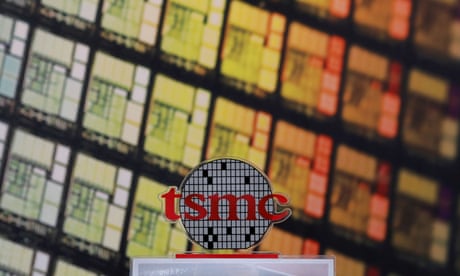How Taiwan secured semiconductor supremacy – and why it won’t give it up
Trump has accused Taiwan of ‘taking’ the US chip sector, but Taipei has been at the forefront of the industry for decades, and its future could depend on it
The Hsinchu Science Park, on Taiwan’s west coast, is lush and green, with streets neatly planned and clearly signposted. The buildings are modern and well maintained – from the outside most visitors wouldn’t even know that they are among the world’s most important factories.
Hsinchu used to be famous for its fishball street snacks, but now it’s referred to as Taiwan’s Silicon Valley, a tech-focused microcosm pipelining workers from school to university and into the world-leading semiconductor industry that is crucial to global supply chains.
The chips, or semiconductors, are the tiny pieces of tech that power just about everything, including computers, mobile phones and cars. A single chip can carry tens of billions of transistors required to make electronic goods work, with the most advanced ones – mostly made in Taiwan – carrying more.
This week, Taiwan’s semiconductors were in the spotlight after Donald Trump rehashed an old accusation that Taiwan had taken the US’s business away. He used the claim to question whether his country’s long running support for Taiwan would continue if he becomes president again in November.
“They took almost 100% of our chip industry,” he claimed in an interview with Bloomberg. “We should have never let that happen.”
In some corners of Taiwan, Trump’s comments were likened to a mobster’s demand for protection money – the US is Taiwan’s most important security partner against China’s threats of annexation.
There’s little to support Trump’s suggestion that Taiwan took what belonged to the US. But what is undeniable is that Taiwan does dominate almost 100% of the most advanced end of the global chip industry.
Taiwan produces about 90% of the world’s most advanced semiconductors, mostly through the Taiwan Semiconductor Manufacturing Co Ltd (TSMC), the world’s largest producer and a major Apple and Nvidia supplier.
“Taiwan simply outcompeted other countries,” says Raymond Kuo, a political scientist at the Rand Corporation.

Manufacturers like TSMC gained ground by focusing on research and development and intense efficiency, managing to cram more transistors on smaller and smaller chip than their competitors. Taiwanese workers are highly educated, and semiconductor jobs are highly paid in a society where salaries are otherwise low compared to the cost of living, but also extraordinarily demanding. Taiwan’s labour protection laws are far weaker than the US and other nations. For a Taiwanese person, working at TSMC or similar is considered a prestigious job with a bright future.
“[Companies] can have three shifts of masters or PhDs running fabs [fabrication plants] each day,” says Kuo. “There’s also the ecosystem of secondary industries built to support chip manufacturers.”
On Thursday, Taiwan’s science and technology vice minister said Taiwan had spent 30 to 40 years cultivating its industry, so it would be “impossible to just replace, and hard to copy”.
Other countries have sought to catch up, but reports suggest the gap is actually widening. Taiwan’s dominance of a component which literally powers the world has raised some concerns about the fragility of global supply chains, particularly if China’s leaders were to one day order an invasion or attack.
“I could imagine Beijing using its control of these production facilities to coerce other countries into accepting its conquest,” says Kuo. “Semiconductors would become another point of leverage that Beijing could use in economic or political coercion of other countries.”
The world got a taste of how a supply chain crisis and chip shortage can affect global trade, during the pandemic, when factory closures snowballed into a global chip shortage which delayed manufacturing and sent prices of cars and other products soaring.
In the wake of this crisis, other countries are attempting to diversify their sources – primarily through Taiwanese companies setting up new fabrication plants overseas. But they aren’t having much success.
Thanks to incentives by the US, some of Taiwan’s production has moved there. TSMC is spending billions building new fabs overseas, including $65bn on three in the US state of Arizona. But reporting from inside the Arizona facility has revealed challenges in replicating the Taiwan model, for reasons as diverse as differing approaches to labour rights and demands on workers.
Morris Chang, TSMC’s founder and former chair, had previously said costs in the US project would be far higher, and described it as an “expensive, wasteful exercise in futility”.
For Taiwan, the dominance is, from a national security perspective, a good thing. Geopolitical observers frequently refer to Taiwan’s semiconductor industry as a “silicon shield” acting as an incentive for the international community to keep Taiwan out of Beijing’s control.
In response to Trump’s comments Taiwan officials emphasised the strong US-Taiwan relationship and broad international cooperation in the chip sector (there are several foreign chip firms in Taiwan), but also indicated they intended to keep its R&D on home soil and maintain industry supremacy.
“Diversification would mean countries have less reason to defend Taiwan,” says Kuo. “Why defend when you can easily switch to a different supplier?”

Frankly, the Government and people of Taiwan need to show that they have the steel and nerves to defend their freedom.
ReplyDeleteTheir lax attitude towards military preparedness so far doesn't inspire confidence in their will to resist Winnie the Pooh and his moronic hordes.
Wakakakaka…
DeleteWith half-hearted spurious 台毒 affection & expected Yankee acceptance, can those frogs garnering ANY steel & nerves to defend their loudmouthed freedom?
Hmmm...ya kah?
ReplyDelete~~~~~
https://x.com/Kanthan2030/status/1814485904251334866?t=dbPOyzqljrsWpZtRPwyvqg&s=19
Brilliant and pragmatic move!
Trump to ask Chinese automakers to build factories in the US.
Everyone else does — Germany, Korea, Japan etc. — so, why not China?
Why? Because Chinese businessmen are not dumb!
Delete~~~~~
ReplyDeletehttps://rumble.com/v4yomvx-colonel-l.-fletcher-prouty-interview-with-bruce-kanier-12-october-1994.html
"Our governments do not know how to operate without the threat of war"